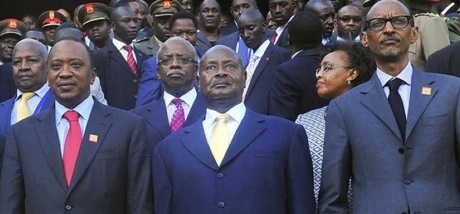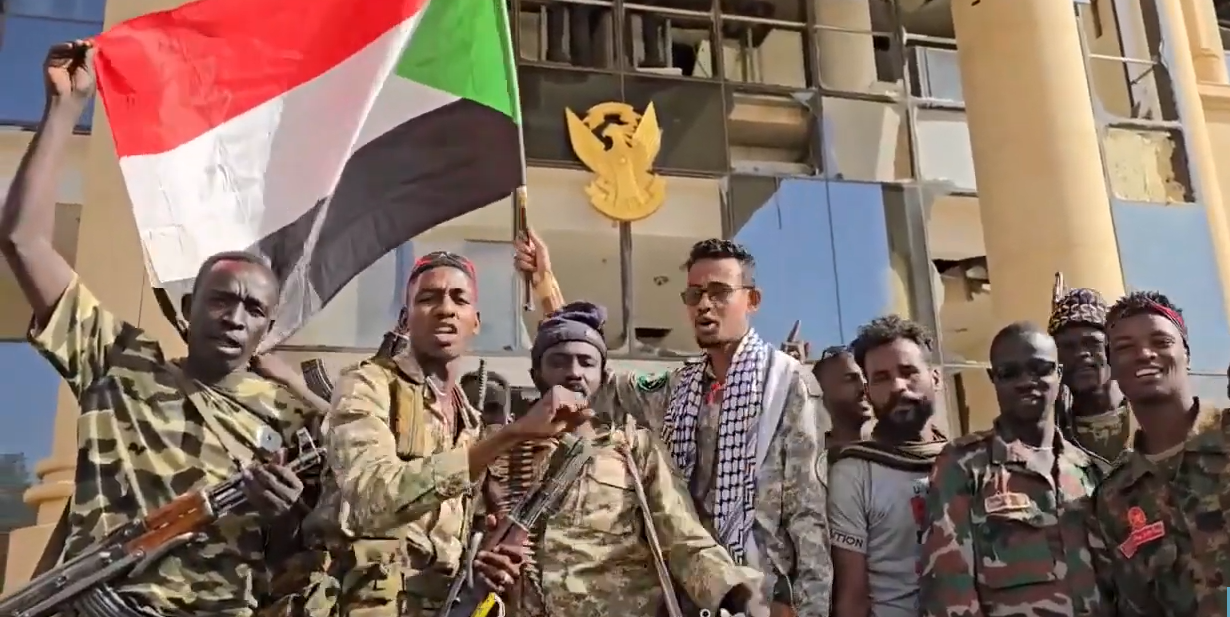Kenyatta, Gen. Museveni, Gen. Kagame and other African presidents– want immunity from war crimes and crimes against humanity
[Commentary]
Last week at an African Union (AU) summit in Equatorial Guinea, African leaders voted blanket immunity protection for themselves and other senior officials against prosecution for war crimes and crimes against humanity committed while they are still serving as president and the timing could not have been worse — most of them are scheduled to attend a summit hosted by President Obama in Washington next month.
The immunity vote means that now the nascent African Court of Justice and Human Rights, which had been seen as a potential home-grown alternative to the International Criminal Court (ICC) has been rendered impotent. The action is tantamount to a gathering of Mafia bosses who then issue a communique that henceforth they should be immune from actions of law enforcement agencies while they serve as the heads of their outfits.
As Hugo Relva, legal advisor at Amnesty International’s Law and Policy Program, told VICE News: “It’s a step backwards in the fight against impunity, and it’s also a betrayal of African victims of serious human rights violations.”
Even before this latest outrage, many of the leaders deserved to be dis-invited to what’s been billed as the U.S.-Africa Leaders summit in August, on account of gross human rights abuses, political repression, military aggression against neighboring countries and massacre of civilians, and torture and assassinations of opponents, as in the cases of Uganda’s Gen. Yoweri Museveni and Rwanda’s Gen. Paul Kagame.
Kenya’s Uhuru Kenyatta is already being tried at the ICC on charges in connection to politically-motivated violence that accompanied Kenya’s 2007 election.
The immunity from prosecution-vote, and the fact that the African leaders decided to carry it out barely one month from the date of the summit to be hosted by President Obama in Washington is a clear affront to the administration and the best evidence that impunity reigns supreme on the African continent.
The worse thing to do would be for the Obama administration to ignore this action by the African rulers and not bar some of the most notorious human rights abusers from attending the summit. This would reward impunity and be seen by these leaders and millions of ordinary Africans, many of whom are the victims of brutal repression and torture, as tacit U.S. endorsement of the travesty.
How can any presidents anywhere in the world, especially on the African continent, be allowed unrestrained accountability for crimes that affect millions of innocent people?
In the case of the leaders of Uganda and Rwanda, these have involved massacres of civilians and plunder of resources, well-documented by the United Nations, Amnesty International, Human Rights Watch, and international media, during their two countries multiple invasions of neighboring Democratic Republic of Congo.
With respect to Uganda, the International Court of Justice (ICJ) found it liable for war crimes in the Congo in 2005 and awarded the victim country $6 billion to $10 billion reparations, which has not yet been paid.
According to an article in The Wall Street Journal on June 8, 2006, the International Criminal Court (ICC) also launched its own investigation and Gen. Museveni asked then UN Secretary General Kofi Annan to block it.
A vote for immunity protection for crimes against humanity and war crimes is in effect an admission that the presidents have either already committed, or anticipate committing the crimes while they are in office.
The campaign by African presidents for innoculation from crimes, not surprisingly, was launched and spearheaded by Uganda’s Gen. Museveni, who may still fear that the ICC could resume its investigation of the alleged crimes in the Congo by Uganda’s military. As commander in chief of the Uganda People’s Defense Force (UPDF) Gen. Museveni himself could be exposed to the possible criminal indictment similar to the ICC’s action against President of Sudan Gen. Hassan Omar al-Bashir.
Gen. Museveni launched vitriolic attacks against the ICC on April 9, 2013 when he delivered the keynote address at the inauguration of Kenya’s President Kenyatta.
He denounced the ICC as a court that only targeted African leaders. While appearing to stand up for Kenyatta, Gen. Museveni obviously had much at stake since the outcome of his campaign would also relieve him from the burden of the alleged Congo crimes.
Later the African Union then took up the campaign and even held a special session in Addis Ababa, Ethiopia, to denounce the ICC’s “racist” targeting and demanded that the Court formally agree that henceforth it would not prosecute these poor innocent African presidents.
Ironically, non of the African leaders, including Gen. Museveni himself, dared to claim that the crimes that have been attributed to them –especially the Congo crimes, as in the case of Uganda and Rwanda, and the election related killings as in Kenyatta’s in Kenya before he became president– have not occurred. If the leaders were not guilty of any of these crimes, and given their access to limitless resources for the best legal defense teams why should they be reluctant to face trial?
Moreover, the leaders of Ghana, Senegal, Nigeria, Malawi, Zambia, Namibia, and scores of other African countries who are also Black have never been charged with any crimes by the ICC. This invalidates the argument that the ICC simply targets African leaders due to the color of their skin, absent serious crimes attributed to them.
While it’s true that the ICC has not taken action to prosecute crimes committed in other regions, such as in the Syrian war, the Middle East and the unfolding calamity in Iraq, this by no means invalidates the need for continued action in areas where the Court has already begun its work; such as in Congo with respect to Uganda and Rwanda; and the actions in Kenya and Sudan.
Which brings us back to the U.S.-Africa Leaders Summit on August 5 and 6.
When President Obama visited Ghana in August 2009 he said the country was a “model for Africa in terms of its democratic practices.” When he addressed Ghana’s Parliament President Obama was actually speeaking to the aspirations of hundreds of millions of Africans when he condemned human rights abuses and corruption and praised “governments that respect the will of the people.” His classic line was that: “Africa doesn’t need strongmen, it needs strong institutions.”
Five years later, President Obama wants to host a summit that brings together as many presidents as possible to highlight some of Africa’s rapidly growing economies and open opportunities for U.S. commercial interests while countering some of China’s recent advances.
But one of the principle U.S. criticisms against China’s economic penetration in Africa is that it works with repressive regimes, including the Sudan’s al-Bashir. How can the U.S. then go ahead and commit the same offense that it accuses China of by embracing some of Africa’s worst human rights abusers, many of whom have now asserted blanket immunity from prosecution?
It would be a serious mistake for the Obama administration to ignore the recent action by the African leaders with the immunity vote at the AU, which is against the interest and well-being of millions of Africans who could be expose to more state-sponsored violence.
In the case of Gen. Museveni, due to the anti-LGBT law he signed in February, he should actually be ineligible to attend the summit following the travel ban and other sanctions announced by The White House against Ugandan officials involved in putting the law in place and in corruption.
At the end of the day, the best immunity from prosecution for war crimes and crimes against humanity is very simple: that’s for African presidents not to commit those serious crimes in the first place.






